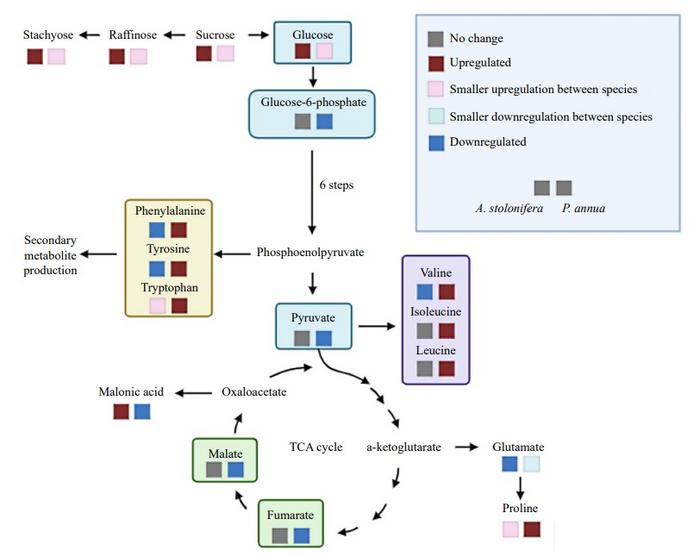A research team has identified key metabolic composition differences between annual bluegrass and creeping bentgrass under heat stress, revealing specific metabolites linked to heat tolerance. Their findings underscore the potential to use these metabolites as biomarkers for breeding more resilient turfgrass varieties. This research holds promise for improving turf management strategies, ensuring that golf courses and sports fields can maintain high-quality turf to defend against rising temperatures and climate variability.

Credit: The authors
A research team has identified key metabolic composition differences between annual bluegrass and creeping bentgrass under heat stress, revealing specific metabolites linked to heat tolerance. Their findings underscore the potential to use these metabolites as biomarkers for breeding more resilient turfgrass varieties. This research holds promise for improving turf management strategies, ensuring that golf courses and sports fields can maintain high-quality turf to defend against rising temperatures and climate variability.
Annual bluegrass (P. annua L.) is a popular cool-season turfgrass on golf courses globally, known for its performance in mild climates like the Pacific Northwest, yet struggles with heat stress in warmer transitional zones. Despite its historical classification as a weed due to its low tolerance to heat, recent shifts in management practices have encouraged its cultivation alongside creeping bentgrass (A. stolonifera). However, P. annua‘s susceptibility to heat-induced stress leads to early degradation of turf quality, posing challenges for maintaining aesthetically pleasing greens.
A study (DOI: 10.48130/grares-0024-00011) published in Grass Research on 19 April 2024, aims to explore the physiological and metabolic differences between P. annua and A. stolonifera under heat stress, seeking to enhance the resilience of these grasses in the face of escalating temperatures due to climate change.
In this study, researchers assessed the physiological responses and metabolic changes of P. annua and A. stolonifera under conditions of heat stress. Through rigorous testing, including the measurement of turf quality (TQ), percent green canopy cover, and leaf electrolyte leakage (EL), significant differences were observed in how each species coped with heat stress. The results demonstrated that A. stolonifera maintained higher TQ and less decline in green canopy cover compared to P. annua, which suffered more pronounced damage. Metabolically, liquid chromatography-mass spectrometry (LC-MS) identified 55 metabolites that changed under heat stress. Notably, A. stolonifera showed a regulated response with 17 upregulated and 22 downregulated metabolites, contrasting with P. annua’s more severe reaction involving 21 upregulated and 26 downregulated metabolites. These results indicate a stronger resilience in A. stolonifera due to a more favorable metabolic adjustment during heat stress, highlighting potential targets for improving heat tolerance in turfgrasses through metabolic engineering.
According to the study’s lead researcher, Bingru Huang, “Understanding the mechanisms for the differential responses of P. annua and A. stolonifera is of great importance for developing strategies to improve turfgrass performance of cool-season grass species in areas with chronic heat stress and anticipated global warming.”
In summary, this work not only enhance our understanding of turfgrass biology under climate stressors but also pave the way for future applications in genetic enhancement and turf management practices. Specifically, the insights gained could lead to the development of genetically modified grasses with improved heat tolerance, offering practical solutions for maintaining green spaces in increasingly warm climates.
###
References
DOI
10.48130/grares-0024-0011
Original Source URL
https://doi.org/10.48130/grares-0024-0011
Authors
Sean McBride, Stephanie Rossi and Bingru Huang*
Affiliations
Sean McBride, and Stephanie Rossi, Department of Plant Biology and Pathology; Rutgers, the State University of New Jersey, New Brunswick, NJ, 08901, USA
About Grass Research
Grass Research (e-ISSN 2769-1675) is an open access, online-only journal focused on mechanistic aspects of biology of grasses with broad international and disciplinary interests. Research papers and review articles published in Grass Research represent significant advances in the mechanistic understanding of the genetic, genomic, molecular, cellular, biochemical, and physiological processes and pathways involved in plant growth and development, as well as interactions with the environment and other organisms, and cultural management practices. Original research and review articles will also cover the development and application of new emerging methodologies and technologies in plant biology, such as gene editing, “Omics”, non-invasive imaging, remote sensing, and artificial intelligence and machine learning technologies. Grass Research also publishes editorials and perspectives for expressing opinions on a specific issue or novel insights about existing research on a particular topic.
Journal
Grass Research
DOI
10.48130/grares-0024-0011
Method of Research
Experimental study
Subject of Research
Not applicable
Article Title
Differential Metabolic Responses to Heat Stress Associated with Interspecific Variations in Stress Tolerance for Annual Bluegrass and Creeping Bentgrass
Article Publication Date
19-Apr-2024
COI Statement
The authors declare that they have no competing interests.




